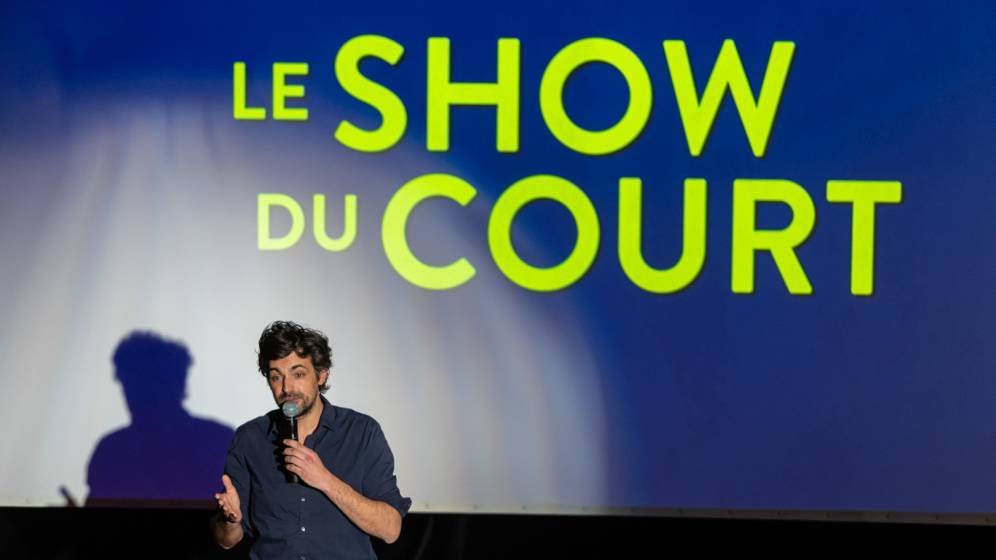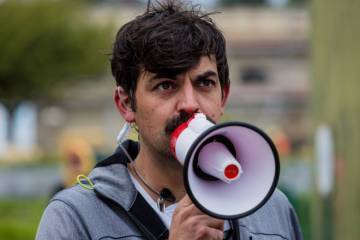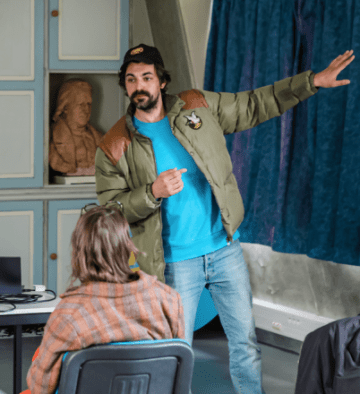Can you present your background?
I am an actor by training, I went through the Actéa in Caen and the Théâtre national de Toulouse where I then worked for ten years during the direction of Laurent Pelly and Agathe Mélinand. In parallel, I discovered the association of Cartel films, in Caen and the organization of a festival of creation of short films «KINO CAEN». It was love at first sight because of the promise of exploration and incredible and innovative freedom that I had in front of me and that never went away. I have little by little took responsibility in the organization of the festival until assuming the co-direction since 2017, before leading for 3 years the structuring of the association. I am now its general coordinator.
Why did you turn to the world of cinema and audiovisual?
I am a child of the mini-dv camera, which was finally more accessible than a theater set at home in the Orne. It is also a more direct means of expression, more raw, carrying a bigger dream. As an actor and on set, I have increasingly appreciated the backstage of audiovisual creation, its craftsmanship, the power it has, the difficulty it represents… A way sometimes less tied up but more contemporary to tell stories. It was a medium of expression with more familiar references, a cultural field closer to mine.
Benjamin Hubert © Julien Hélie
What is really motivating in the conduct of cultural actions (participatory filming, workshops, image education)? What do you get out of it?
Motivation is exchange. We bring skills in a field and a certain way of seeing and thinking the world. We face other skills and other worldviews. Complementary. Through the creation it forms a whole, we do not know very well where it started and the final object, usually a fiction film of about ten minutes, is the result of this sharing. It is very enriching to see that we have things to transmit, share and explore, especially when we discover a territory.
You lead a large number of projects in the territories, with citizens (Eté Culturel in Putanges-le Lac, shooting in Mortain). Is there something specific within the territories? More authenticity? Spontaneity? The place of culture is special?
First I would like to say that one rural territory does not do the other. The «rurality» is a way to oppose the urban centers and the campaigns for example, for obvious reasons, certainly. But a village of Orne or La Manche, and even of La Manche and La Manche only separated by a few kilometers is a story, habits that, if we dig, can prove to represent two different worlds. Moreover, these worlds are more open than one can imagine (reception of migrants, settlement of foreigners, proposals for social and cultural actions) and whose representatives, elected officials, are perhaps more anchored in their territory. Seemingly smaller stakes are in fact the result of a real commitment: I knew the battle in my village for the creation of a roundabout and the path it represented between oppositions, financing or the administrative adventure. Things are also more centralized, more organized around town halls and public services.
What do you think about rural culture (accessibility, public, supply)?
What I like in these territories, to make a generality, is that culture, often, is not neglected by choice as one might think, but it is not either more important than the issue of access to a general practitioner, the issue of transportation or keeping a maternity ward open or the construction of a roundabout. Proposing cultural actions is therefore, when it starts from the inhabitants and what exists, very often very well received. Some territories, not necessarily having relay structures to make the link between an action and the inhabitants, it sometimes takes a longer time for a kind of trust to be established. Actions over a period of time are often more effective.
Benjamin Hubert © Julien Hélie
What are the obstacles to better access to culture in rural areas? To a more homogeneous offer in the territory?
For me, it would require means for cultural structures with an activity that radiates can regularly intervene in rural areas, and not necessarily around emblematic projects elsewhere. In some territories offers exist, often held by volunteers or associations that other structures, more seasoned or professional, should be able to increase from time to time. I am also thinking of creating a link between rurality and the city. Going the other way than what we are doing. Working within a territory is essential but we could also imagine a purpose that would take place where cultural structures live, that is to say in cities very often. I am thinking specifically, as far as we are concerned, of the organization of screenings in cinemas of the agglomeration of Caen. Projections that would also aim to share the experience of cultural actions between territories with the presence of stakeholders from different territories.
What are the main areas for improvement?
I think we should imagine a follow-up over several years in territories. Doubling a project or imagining a complement to this project: this is what we envisage in Noues de Siena for example, by proposing a twinning within the college Jean Villar in addition to a project «Rural territories, territories of culture» that we realized 2 years ago. Middle school students who participated in the action and/or attended a screening with the presence of the team. And to go further why not also imagine actions that would link territories, in order to highlight their differences and commonalities, to show everyone that it is part of a common world. A village in the Eure very dependent in its basin of life of a factory implanted for decades surely has many points in common with a village of La Manche having the same characteristics. And also surely fundamental differences that would be interesting to transcribe significantly. For conventional actions, it would be necessary to think of a long time of appropriation of the territory, not necessarily more days of presence.
Partager la page


